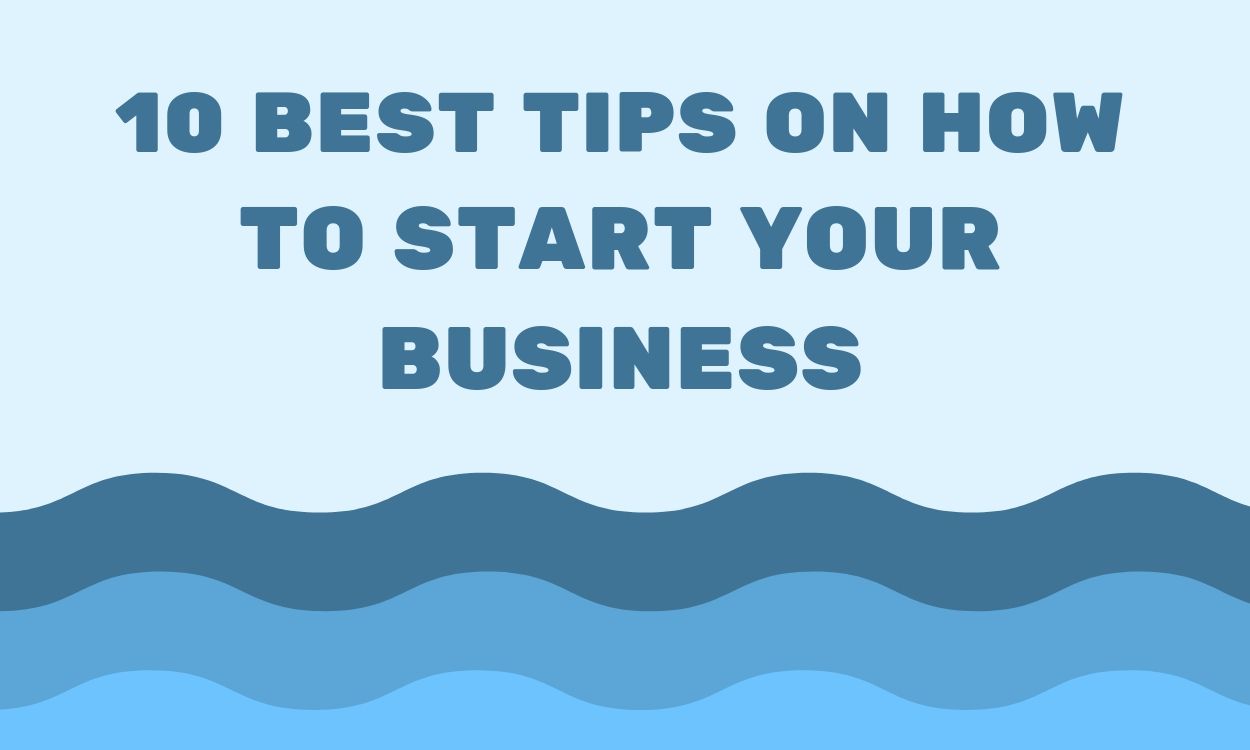Have you always dreamed of being your own boss, setting your own hours, and running a business that aligns with your passions? Starting a business can be an incredibly rewarding experience, but it also comes with its fair share of challenges. As someone who has been through the ups and downs of starting a successful business, I’m here to share my top 10 tips for getting started on the right foot. From finding your niche to building a strong network, these essential tips will help you navigate the world of entrepreneurship and set yourself up for success. So grab a pen and paper (or open up your favorite note-taking app) because we’re about to dive in!
Why Start Your Own Business?
There are many reasons why you might want to start your own business. Maybe you’re tired of working for someone else, or you’re looking for a way to make more money. Whatever your reason, starting your own business can be a rewarding experience.
But it’s not always easy. There are a lot of things you need to do to get started, and it can be overwhelming. That’s why we’ve put together this list of essential tips for starting your own business.
If you follow these tips, you’ll be on your way to starting a successful business:
- Do Your Research
Before you jump into starting your own business, it’s important to do your research. You need to understand the market, what your potential customers want, and what you need to do to reach them. There’s a lot to learn, but luckily there are plenty of resources out there to help you get started.
- Create a Business Plan
A business plan is like a roadmap for your business. It will help you map out where you want to go and how you’re going to get there. Without a plan, it will be difficult to make decisions about your business and track your progress over time. So take the time to create a detailed business plan before getting started.
- Find the Right Location
The location of your business is important
Identify Your Target Market
Your target market is the group of people most likely to buy your products or services. To find your target market, you need to understand who your business serves and what needs your business meets.
There are a few key questions you can ask to help you identify your target market:
Who are my ideal customers?
What does my ideal customer need or want?
What can my business offer that my ideal customers need or want?
Once you’ve answered these questions, you should have a good understanding of who your target market is and what they’re looking for. From there, you can start tailoring your marketing and sales efforts to better reach and serve your target market.
Prepare a Business Plan
A business plan is a document that describes your business, its objectives, strategies, target market and financial forecasts. It is important to have a business plan when starting your own business as it will give you a road map to follow and help to keep you on track.
There are a few key things that should be included in your business plan:
- Executive Summary: This is a brief overview of your business plan and should include the main points of what your business does, your target market and how you plan to make money.
- Company Description: This section should describe your company, including its history (if any), structure (e.g. sole proprietorship, partnership or corporation) and management team.
- Products and Services: Here you will describe the products or services you offer and how they meet the needs of your target market.
- Market Analysis: In this section you need to identify your target market and describe the trends that are happening in that market. You will also need to do some research on your competition.
- Sales and Marketing Plan: This section outlines your sales and marketing strategy, including how you plan to price your products or services, promote them and distribute them to your customers.
- Financial Plan: The financial section of your business plan should include financial projections for the next three years, as well as information on any start-up costs or investments you will need to make.
Create a Budget & Financial Plan
Creating a budget and financial plan is one of the most important steps you can take when starting your own business. Without a clear understanding of your income and expenses, it will be difficult to make informed decisions about how to grow your business.
There are a few key elements that should be included in your budget:
Fixed costs: These are expenses that remain the same each month, such as rent, insurance, and salaries.
Variable costs: These are costs that can fluctuate from month to month, such as advertising and raw materials.
One-time costs: These are expenses that you will only incur once, such as legal fees or website development costs.
Once you have a good understanding of your income and expenses, you can start to develop a financial plan. This should include short-term goals (such as ensuring you have enough cash on hand to cover monthly expenses) and long-term goals (such as saving for retirement or investing in new equipment).
Developing a budget and financial plan may seem like a daunting task, but it is essential for any successful business. With careful planning and execution, you can ensure that your business is on sound financial footing from the very beginning.
Find Your Funding Sources
There are a number of ways to finance your new business venture. You can use personal savings, take out a loan, or seek investment from venture capitalists.
Personal savings is often the most common source of funding for new businesses. If you have saved up enough money to cover the start-up costs of your business, this can be a great option. However, be aware that using personal savings can be risky – if your business fails, you could lose all of the money you’ve put into it.
Taking out a loan is another option for financing your business. There are many different types of loans available, so be sure to do your research to find the best option for your needs. Be aware that taking out a loan will require you to make regular payments, which can be difficult if your business is not yet profitable.
If you’re looking for more significant funding, you may need to seek investment from venture capitalists. This can be a great option if you have a solid business plan and some initial traction with customers or users. However, raising capital from investors can be a long and difficult process.
Choose a Business Structure
There are several different business structures to choose from when starting your own business. The most common structures are sole proprietorships, partnerships, limited liability companies (LLCs), and corporations. Each type of business has its own advantages and disadvantages.
Sole proprietorships are the simplest and most common type of business structure. They are owned and operated by one person, and there is no legal distinction between the owner and the business. Sole proprietorships are easy to set up and require little paperwork. However, they offer no personal liability protection for the owner, meaning that the owner is personally responsible for all debts and liabilities of the business.
Partnerships are similar to sole proprietorships in that they are owned and operated by two or more people. Partnerships can be either general partnerships or limited partnerships. In a general partnership, all partners share equally in the profits and losses of the business. In a limited partnership, there is at least one partner who is only liable for the debts of the business up to the amount he or she has invested. Partnerships offer some personal liability protection for the partners, but not as much as corporations or LLCs.
Limited liability companies (LLCs) are a hybrid structure that combines features of both partnerships and corporations. Like partnerships, LLCs have flexible management structures and offer personal liability protection for their owners. However, LLCs also have many of the same advantages as corporations, including potential tax benefits and greater credibility with investors
Obtain Permits & Licenses
If you’re starting your own business, you’ll need to obtain the proper permits and licenses from your local government. This can be a daunting task, but we’ve got some tips to help you through the process.
Before you start your business, check with your city or county government to find out what permits or licenses you’ll need. You may need a business license, a zoning permit, or a special permit for your type of business. For example, if you’re starting a restaurant, you’ll need a food handling license.
The process for obtaining a permit or license varies from jurisdiction to jurisdiction, so be sure to check with your local government for specific requirements. In most cases, you’ll need to submit an application and pay a fee. You may also need to provide proof of insurance or other documentation.
Once you have all the necessary permits and licenses in hand, you’ll be ready to start your business!
Set up Accounting & Tax Requirements
If you’re starting your own business, there are a few essential accounting and tax requirements that you’ll need to set up. First, you’ll need to obtain a business license from your local government. This will allow you to operate your business legally. Next, you’ll need to set up a business bank account. This will help you keep track of your finances and ensure that your money is properly accounted for. You’ll need to file for a Tax Identification Number (TIN) from the IRS. This number will be used when filing your taxes and will help the government identify your business. By following these simple steps, you can ensure that your business is compliant with all applicable laws and regulations.
Develop a Marketing Plan
Developing a marketing plan is essential for any business, big or small. Without a plan, your business will not have a clear direction and could quickly become lost in the sea of competition. Your marketing plan should be tailored to your specific business goals and objectives. It should be realistic and achievable, with measurable milestones so you can track your progress.
Here are some tips to help you develop a successful marketing plan:
- Define your target market. Who are your potential customers? What are their needs and wants? How will your product or service meet their needs? Knowing your target market is essential to developing an effective marketing strategy.
- Research your competition. What are they doing right? What are they doing wrong? How can you differentiate yourself from them? Understanding your competition is key to developing a competitive advantage.
- Set realistic goals and objectives. What do you want to achieve with your marketing efforts? Be specific and measurable so you can track your progress and adjust your strategy as needed.
- Choose the right mix of marketing tactics. There are many different marketing channels available, so it’s important to choose the ones that will work best for your business and reach your target market most effectively. Some common marketing tactics include advertising, public relations, social media, and email marketing.
- Create compelling content. Whether it’s a website, blog post, or social media update, make sure what you’re saying is interesting and engaging
Get Insured & Legal Protection
If you’re starting your own business, it’s essential to get insured and have legal protection. There are a few different types of insurance you should consider, and a few different ways to get legal protection.
The first type of insurance you should get is liability insurance. This will protect you from any lawsuits that may arise from your business activities. You should also get property insurance, which will protect your business premises and equipment from damage or theft.
There are a few different ways to get legal protection for your business. You can set up a limited liability company (LLC), which will offer some protection from personal liability. You can also register your business with the state, which will give you some legal protections under state law. You can consult with an attorney to draft contracts and agreements that will help protect your interests.
Make It Official – Register Your Business!
If you’re starting your own business, the first thing you need to do is make it official by registering your business. This can be done by filing for a DBA (Doing Business As) or LLC (Limited Liability Company) with your local government. Once you’ve registered your business, you’ll need to get a business license and permits from your city or county. Depending on what type of business you’re starting, you may also need to get a state license as well. After you’ve taken care of the legalities of starting your own business, you can move on to setting up your business finances.
Conclusion
Starting a business can be an exciting and rewarding journey, but it is also fraught with challenges. With these 10 essential tips for starting your own business, you will have the knowledge and support you need to get started on the right foot. From creating a business plan to setting realistic goals, these tips will give you the solid foundation required to launch and grow a successful entrepreneurial venture. Here’s wishing you all success in your new venture!



